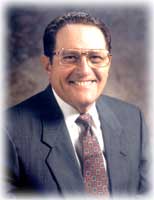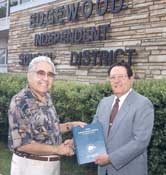
See video biography
José A. Cárdenas School Finanice Fellows Program
Perhaps it was inevitable that José Angel Cárdenas would spend most of his professional life working in the development of multicultural and bilingual programs. He was born in Laredo, Texas, in 1930 with an extensive number of relatives on both sides of the U.S.-Mexico border. Growing up this environment gave him two cultures from which to draw strength and creativity.
Or perhaps it was his ability to see things in a different light, to recognize what was happening to so many students, and to identify where change needed to occur. “If students are faltering, failing, or leaving school, then their schools – not the students – need to change in fundamental ways,” he stated often.
 Or it could have been his incredible, unconventional vision – a vision that refused to accept things as they were. He insisted that every single child deserves an excellent education, and that their economic circumstance, language or ethnicity were not valid excuses for mis-education, that schools were either not equipped or were unwilling to serve certain children.
Or it could have been his incredible, unconventional vision – a vision that refused to accept things as they were. He insisted that every single child deserves an excellent education, and that their economic circumstance, language or ethnicity were not valid excuses for mis-education, that schools were either not equipped or were unwilling to serve certain children.
A professional educator for more than 45 years, Dr. José A. Cárdenas was not ever a person of ordinary consequence. He served as superintendent of an urban school district, chairman of the education department at an institute of higher education, director of a research and development center, and at all levels of the educational professional hierarchy.
 Dr. Cárdenas held an Ed.D. from the University of Texas at Austin (1966), an M.Ed. from Our Lady of the Lake University in San Antonio (1955) and a B.A. from the University of Texas at Austin (1950). In 1997 he received the Distinguished Alumni Award from the Ex-Students’ Association of The University of Texas.
Dr. Cárdenas held an Ed.D. from the University of Texas at Austin (1966), an M.Ed. from Our Lady of the Lake University in San Antonio (1955) and a B.A. from the University of Texas at Austin (1950). In 1997 he received the Distinguished Alumni Award from the Ex-Students’ Association of The University of Texas.
He also served in the U.S. Army Infantry as a radio operation instructor from 1951 to 1953.
 In 1973, he founded the Intercultural Development Research Association, a non-profit research and public education organization dedicated to strengthening schools to work for all children. As a result of Dr. Cárdenas’ leadership and vision, IDRA gained national recognition for its research capabilities and the training and technical assistance it offers in the areas of bilingual and multicultural education, school finance equity, early childhood education, community involvement programs, and the design of culturally responsive technology-infused instructional programs. (See “It was the defining moment.”)
In 1973, he founded the Intercultural Development Research Association, a non-profit research and public education organization dedicated to strengthening schools to work for all children. As a result of Dr. Cárdenas’ leadership and vision, IDRA gained national recognition for its research capabilities and the training and technical assistance it offers in the areas of bilingual and multicultural education, school finance equity, early childhood education, community involvement programs, and the design of culturally responsive technology-infused instructional programs. (See “It was the defining moment.”)
When he was named in 1955 as vice principal of Edgewood High School in San Antonio, he became the first Hispanic administrator serving the district. In 1969, he was appointed superintendent of the Edgewood school district, thus becoming the first Hispanic school superintendent in the city of San Antonio and Bexar County. He also established the first districtwide, non-Head Start early childhood education program for all 3-, 4- and 5-year-old children in that district. A special school (José Cárdenas Early Childhood Education Center) in the Edgewood school district was named for him in 1972 and was rededicated in 2010.
From 1961 to 1967, Dr. Cárdenas served as associate professor and chair of the Department of Education at St. Mary’s University in San Antonio. In the late 1960s, he directed research projects at the Southwest Educational Development Laboratory. And later, in 1990-91, he was a visiting professor at the University of Texas at San Antonio in educational leadership. He served as a guest lecturer, consultant and conference participant at more than 70 colleges and universities throughout the country.
During his days as a classroom teacher, he worked in multicultural settings with very limited resources. Later, as a school superintendent, he recognized the systemic barriers to providing that excellent education he envisioned. While most of his peers either saw no problem or felt the injustices to children were unsolvable, Dr. Cárdenas dedicated his life’s work to making his vision a reality.
Dr. Cárdenas knew part of his task would be to change the system that was “abusing” children. He served as a source of technical information to state and federal legislatures and administrations as well as to foundations, policy organizations and community-based organizations throughout the country. After testifying in the landmark Lau vs. Nichols case, he assisted in the development of the Lau Remedies by the Office for Civil Rights. This was the first guide for schools that served language-minority populations. Dr. Cárdenas felt Lau was a test of The Theory of Incompatibilities, which he and colleague Dr. Blandina Cárdenas conceptualized in 1968. This theory raised the five areas of incompatibility between a child’s situation and the school’s response that are detrimental to the child’s learning. It would become central to Dr. Cárdenas’ philosophy.
Throughout his five-decade career, Dr. Cárdenas was a key leader in developing litigation strategy and serving as an expert witness in more than 70 important court cases focused on services to minority and language minority students, such as Denver vs. Keyes and Castaneda vs. Pickard. He would be one of the key people involved with Senator Yarborough in helping create and fund federal legislation for children who were limited English proficient, Title VII of the Elementary and Secondary Education Act.
Dr. Cárdenas was instrumental in developing the bilingual education-related strategies that included the litigation known as the U.S. vs. Texas Motion that resulted in a court order leading to the foundation for SB 477, the Texas Bilingual Education Act. His role in the formation of that law, which is still in effect today, led to its being considered the strongest state bilingual education law in the country. In the mid-1970s, he led a research effort to examine the funding levels needed for effective implementation of bilingual education, finding that most bilingual education programs suffer from gross inadequate funding.
But much of Dr. Cárdenas’ contributions would focus as well on directly improving instruction of children. He coordinated development of curriculum, such as Amanecer, when there was none focused on bilingual instruction. Dr. Cárdenas’ recognized the disconnect between university-based teacher preparation programs and the schools those teachers would move into. As a result, IDRA would provide technical assistance to schools to improve early childhood programs, bilingual education practices and the education of immigrant students. IDRA would also work with universities to better prepare teachers for working with diverse students.
As superintendent and as director of IDRA, he set in place unique professional development for thousands of school teachers and administrators. He insisted that teacher training value the knowledge and experience that teacher bring. Teachers became the innovators for the benefit of their own students.
Nationally recognized as an educational expert and civil rights advocate, Dr. Cárdenas served as a source of technical information to state and federal legislatures and administrations as well as to foundations, policy organizations and community-based organizations throughout the country. These include the Texas legislature, U.S. congressional representatives, the U.S. Department of Justice, the Mexican American Legal Defense and Educational Fund, the Harvard Center for Law and Education, the National Urban Coalition, the Hearst Foundation, the Rockerfeller Foundation, the Ford Foundation, the U.S. Department of Education, and the U.S. Department of Health and Human Services.
Dr. Cárdenas was on the policy-setting boards of the Center for Applied Linguistics, the Manpower Demonstration Research Corporation, the National Research Center for Vocational Education, the Institute for Finance and Governance at Stanford
University, and AVANCE, a community-based organization in San Antonio. More than 50 colleges and universities and 300 school districts nationwide have been the recipients of Dr. Cárdenas consultation services. He has also worked abroad in Mexico, Hawaii, Guam, Guatemala, Peru and the former Soviet Union as an expert consultant.
Numerous state and national organizations have honored Dr. Cárdenas for his commitment and contributions. He was the U.S. Commissioner for the International Year of the Child in 1978, and was a Special National Award Recipient of the Human Rights Award given by the National Education Association in 1972. He was cited as Educator of the Year in 1980 by the Texas Association for Bilingual Education. He received the National Association for Bilingual Education Special Recognition Award in 1982 and was honored as a NABE Texas Pioneer in Bilingual Education in 1993.
Dr. Cárdenas authored several books, including Multicultural Education: A Generation of Advocacy, a historical overview of the most significant issues in multicultural education and All Pianos Have Keys and Other Stories (out of print), which includes articles on his life with personal anecdotes and articles on a variety of professional topics addressed in a lighter context than is possible in professional publications. In Texas School Finance Reform: An IDRA Perspective, Dr. Cárdenas documented the 28-year history of school finance in Texas. His recollections, impressions and opinions were strongly substantiated by an IDRA collection of documents compiled during the entire 28-year period. His latest book, My Spanish-Speaking Left Foot, depicts the cultural influence of Mexico and the Spanish-speaking world for a Mexican American living in the United States.
Upon retirement from IDRA, José A. Cárdenas received many lifetime achievement awards from organizations, including The Coca-Cola Foundation. In 1999, the Mexican American Library Program at the University of Texas at Austin established a collection of his papers (the Dr. José A. Cárdenas/IDRA Collection) reflecting his activities as founder and director of IDRA.
Following his retirement from IDRA in 1992, Dr. Cárdenas served as director emeritus of IDRA until his death in September of 2011.
